election monitoring
Posted by KatrinVerclas on Aug 12, 2007
In Sierra Leone's national election today, 500 election observers at polling stations around the country are reporting on any irregularities via SMS with their mobile phones. Independent monitoring of elections via cell phone is growing aqround the world, spearheaded by a few innovative NGOs.
The story starts in Montenegro, a small country in the former Yugoslavia. On May 21, 2006 the country saw the first instance of volunteer monitors using SMS, also known as text messaging, as their main election reporting tool. A Montenegrin NGO, the Center for Democratic Transition (CDT), with technical assistance from the National Democratic Institute (NDI) in the United States, was the first organization in the world to use text messaging to meet all election day reporting requirements.
Posted by AnneryanHeatwole on Dec 03, 2011
On November 8, 2011, the Liberian President Ellen Johnson Sirleaf won her re-election campaign following a contentious runoff vote. In the October 11 general election, neither of the top two presidential candidates secured a majority vote –Johnson Sirleaf received 43.9% of votes and opposition candidate Winston Tubman received 32.7% of the nation’s votes. Johnson Sirleaf and Tubman were scheduled to participate in a November 8 runoff election; however, Tubman boycotted it saying that the first elections had been unfair; a claim international election observers dispute. As the only candidate, Sirleaf won the runoff despite a low 37.4% of eligible voters coming out for the second round (compared to more than 70% for the first round).
In light of the election’s tumult, MobileActive.org spoke to the National Democratic Institute and Ushahidi Liberia to learn more about their respective work in the country encouraging transparency and fairness through election monitoring and citizen reporting.
The National Democratic Institute and Ushahidi in the 2011 Liberian Elections
Elections can be rigged in many ways, and voter fraud is varied. For instance, ballots can be changed or manipulated, voters can be influenced through intimidation or bribes, violence can shut down polling stations, or ballots can be changed after the election before the results are announced. Technical difficulties can also influence an election by preventing voters from casting their votes or having those votes accurately counted; difficulties could include long lines, failure to open a polling place on time, or a lack of necessary supplies.
| Technology in the 2011 Liberian Elections: Mobiles, Monitoring, and Mapping data sheet 1787 Views |
| Countries: |
Liberia
|
Posted by AnneryanHeatwole on Oct 25, 2011
Following this weekend's Tunisian elections, the world is looking to the Middle East to see how new democracies are born. But in many countries with emerging democracies, fraud and corruption can taint the credibility of elections, and the public's trust in the fairness and validity of election results. We have long argued that technology - mobile technology in particular - can play a key role in helping to ensure fair and accurate voting processes and results. However, data has been missing to make that point more definitively.
In areas where much of the voting process isn't digitized, using technology can help mitigate vote tampering and incorrect results. Additionally, SMS reports of vote tabulation from polling stations by trained election observers can be an effective way of limiting voting fraud and corruption, and has been used in different elections around the world. In Lebanon's 2009 elections, roughly 2500 volunteer citizen observers reported from a statistically significant number of polling station incidence reports throughout election day. In Nigeria, 2011 Project Swift Count deployed 8000 trained election observers across the country to report on the elections, including election results from polling stations directly, using SMS.
| Tech in Election Monitoring: Fighting Fraud and Corruption, one Picture at a Time data sheet 2009 Views |
| Countries: |
Afghanistan
|
Posted by VivianOnano on Jun 30, 2011
The Role of Technology and Citizen Media in Promoting Transparency, Accountability and Civic Participation data sheet 2276 Views
Author:
David Sasaki; Renata Avila; Sopheap Chak; Jakub Górnicki; Rebekah Heacock; Victor Kaonga; Sylwia Presley; Manuella Maia Ribeiro; Namita Singh; Carrie Yang
Abstract:
This report is structured in three sections. The introduction examines the differing aspects between traditional watchdog journalism and online media that rely on raw data sources, often directly from government websites. The introduction also aims to contextualize the benefits of transparency, accountability and civic engagement from a grassroots, networked perspective.
The second section of the report consists of regional overviews authored by each of our eight researchers. These overviews document the history of the good governance movement in each region, the role of technology in promoting transparency and accountability, and summaries of the case studies they documented. The concluding section groups case studies thematically in order draw out trends, conclusions and recommendations that apply across a number of projects.
Posted by MarkWeingarten on Feb 14, 2011
The Sudan Vote Monitor - Preliminary Report data sheet 3172 Views
Author:
The Sudan Institute for Research & Policy
Abstract:
The purpose of the Sudan Vote Monitor (SVM) project was to utilize simple information and communication technology (ICT) tools in the independent monitoring and reporting of the Sudan national elections held in April 2010. This initiative built on the successful recent experience of civil society organizations (CSOs) and volunteers in several countries (e.g., Ghana, India, Sierra Leone, Montenegro) in harnessing ICT to support the conduct of fair and credible elections. The project’s primary focus is the process of observing and reporting rather than the election results or their implications as significant as these are. Accordingly, SVM, and this report, is only concerned with the reporting activity with no regard to the political climate or political orientation of reporters, CSOs,or candidates. The main objective is to cooperate with and facilitate technological knowhow for civil society organizations in the Sudan (grassroots and other NGOs, media organizations, journalists, and interested private citizens and individuals in general).
The project was led by SIRP in collaboration with Asmaa Society for Development and several other Sudanese NGOs, with technical support from eMoksha.org, Ushahidi.com, and Khotawat Consultancy. During the April national elections, the Sudan Monitor website enabled reporting of the election process by many different organizations and individuals. Through the use of open source software civilians in Sudan were able to report general observations or irregularities via e-mail, short code text message (SMS), or by logging on to the Internet and visiting the sudanvotemonitor.com website. Using the Ushahidi platform reports could be aggregated along with direct feeds from news sites, blog posts, photos, videos and tweets related to the elections from all relevant sources, in one place, on an interactive map. Users had up-to-date information including streaming video from election centers or polling stations around the Sudan, and were able to comment and rate the credibility of the submitted reports in collaborative manner. The site was accessible to all individuals and organizations regardless of their political affiliations or views. The reporting facility was available for public reporting from April 10 to April 30, 2010.
Posted by MohiniBhavsar on Sep 16, 2010
Digitally Networked Technology in Kenya's 2007-2008 Post-Election Crisis data sheet 2305 Views
Author:
Joshua Goldstein and Juliana Rotich
Abstract:
Written largely through the lens of rich nations, scholars have developed theories about how digital technology affects democracy. However, primarily due to a paucity of evidence, these theories have excluded the experience of Sub-Saharan Africa, where meaningful access to digital tools is only beginning to emerge, but where the struggles between failed state and functioning democracy are profound. Using the lens of the 2007–2008 Kenyan presidential election crisis, this case study illustrates how digitally networked technologies, specifically mobile phones and the Internet, were a catalyst to both predatory behavior such as ethnic-based mob violence and to civic behavior such as citizen journalism and human rights campaigns.
The paper concludes with the notion that while digital tools can help promote transparency and keep perpetrators from facing impunity, they can also increase the ease of promoting hate speech and ethnic divisions.
Posted by AnneryanHeatwole on Jul 23, 2010
Today's Mobile Minute brings you news about the relationship between consumers and telecoms in Sierra Leone, potential problems with mobile phones for transparency in elections, law enforcement officials pulling evidence from iPhones, how international roaming charges were dropped in East Africa, and why geotagging photos may not be in your best interest.
| Mobile Minute - Daily M4Change News data sheet 2103 Views |
| Global Regions: |
|
| Countries: |
Sierra Leone
|
Posted by admin on May 31, 2010
Recently, we’ve been seeing a lot of hype about citizen reporting with mobile phones during elections. It is often conflated with the term “election monitoring,” but this does a disservice to both citizen reporting and election monitoring, a discipline and field that has been around for some 20 years. These two approaches have markedly different goals, target audiences, and processes. We think it is time for readers to definitively understand what election monitoring is in contrast to citizen reporting, and what the role of mobile phone and mapping platforms are in regard to these two very different forms of engagement during elections. We aim to clearly differentiate between them once and for all.
We also urge the adoption of differing terms - citizen reporting during an election versus systematic election monitoring. Mobile phones, SMS, and mapping platforms play a role in both citizen reporting and election monitoring, of course.
Posted by KatrinVerclas on Feb 25, 2010
As we are getting ready for our event in Washington DC tomorrow that will focus on New Tools for Better Elections, we are excited to see that more open source options for mobile data collection and analysys are becoming available than ever sbefore. Development Seed, one of the most promising Drupal development shops around right now, has been an innovator in developing platforms for data analysis, in particular.
We can now dynamically map and visualize real-time SMS messages in Managing News using the new SlingshotSMS feature. All the code is available on github.
This release is particularly exciting for us because it ties together two of our core projects in such a way that each is made better. SlingshotSMS is a lightweight SMS gateway that can be run off of a USB drive, needing only a GSM modem and an internet connection to act as a bridge between mobile phones and the web. Managing News is a powerful data aggregator and visualization tool that lets distributed teams work together to make large amounts of information useful. Together, they provide an extensible framework for teams conducting mobile data collection projects in the field.
Extensibility is key here because we need this to meet a wide variety of use cases in order for it to be useful. We have been particularly focused on use cases related to election monitoring, but this is just one of many possible applications. Here's a graphic that Saman made illustrating how the system works:
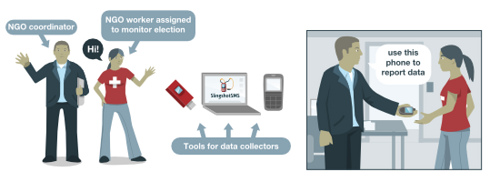
This technology is meant to accompany your existing processes of data collection. You have people in the field, they have cellphones, you have a phone back in headquarters, and they can text in messages to you that are then relayed to a visualization space, which helps keep you and your team on the same page.
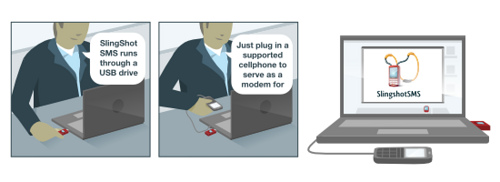 Since SlingshotSMS runs on a USB drive, you just plug it in, plug in your phone, and set up what website you want to have the SMS messages sent to. The SMS messages are turned into RSS 2.0 and PUSHed, like as a fat ping. You computer just needs internet to send these messages.
Since SlingshotSMS runs on a USB drive, you just plug it in, plug in your phone, and set up what website you want to have the SMS messages sent to. The SMS messages are turned into RSS 2.0 and PUSHed, like as a fat ping. You computer just needs internet to send these messages.
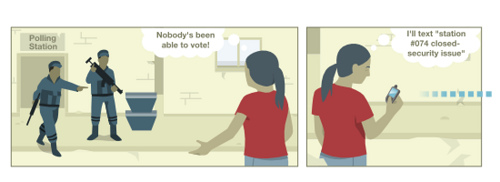
Going back to this election monitoring example, here you see the election monitor is texting in that the polling station is closed. You'll notice that the text message contains a few things: a polling station ID, the word "closed", and the word "security." These are key terms we are going to want to look for on the Managing News side to flag.
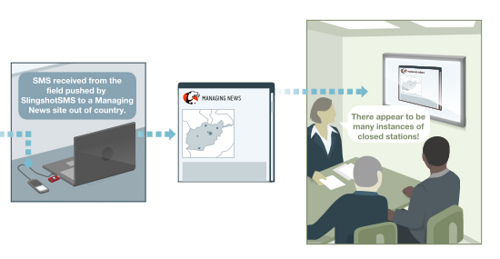
SlingshotSMS just pushes the data up to Managing News. The Managing News site will have a custom parser that will break up this text message, pulling out key words and numbers.
Customizing SMS parsing for each project
Out of the box, the Managing News/SlingshotSMS bridge simply accepts the SMS and incorporates it into the default Managing News workflow, ignoring important information in this example like the fact the polling station is closed and there is a security issue. This is where the pluggable nature of Managing News proves its worth. It is simple to write a custom parser that replaces the default parser that ships with Managing News. With some creative use of the Drupal taxonomy system to filter incoming results into Managing News channels and some very basic regex, you can quickly have a system that is able to capture this data and let Managing News users react to it. We'll publish a blog post soon explaining exactly how to do this.
Authentication
Authentication of incoming SMS messages is vital in these situations, and we took extra care to make sure the Managing News Slingshot feature will only receive data from authorized sources. The framework is dependent on the Drupal KeyAuth module which allows signed messages to pass between a SlingshotSMS installation and Managing News. When setting up the Managing News Slingshot feature, users are given public and private keys that they then copy into the SlingshotSMS configuration file. In the future we are considering switching to an OAuth based solution.
To get set up, you'll need the following:
Editors Note: We will test-run Managing News and Slingshot in an upcoming software review but meanwhile congratulate Development Seed on the ongoing efforts in building better open source tools for mobile data collection and analysis.
| Election Monitoring with SMS: Lightweight Mobile Data Collection Meets Powerful Mapping Analytics data sheet 6995 Views |
| Countries: |
Afghanistan
|
Posted by AnneryanHeatwole on Feb 08, 2010
The National Democratic Institute and MobileActive.org are hosting "New Tools for Better Elections", a conference on February 26th on new technologies for fair, representative and equitable elections. In preparation for the event, we sat down with Ian Schuler, Senior Manager of Information and Communications Technology Programs at the National Democratic Institute. Schuler specializes in the application of mobile technology for the advancement of democracy and human rights, He is the author of SMS as a Tool in Election Observation.
In this conversation, Schuler breaks down not only the differences between election observation, citizen reporting, and crowd-sourcing, but also explains why these distinctions matter and how mobile technology is changing the way elections are held. Read on for excerpts from our conversation, or scroll down to watch the interview in its entirety.
Q: You and NDI have done a lot of election monitoring around the world. Explain why election monitoring matters.
A: Elections are the main process by which people participate in their government by selecting their leaders. People expect that it’s going to be a fair process, and that it’s going to be an accurate process. So it’s important for people to have confidence to know that somebody is really systematically watching the entire process to make sure that it is good. Election monitoring prevents fraud by making it harder for the people who want to manipulate elections to do so; it detects fraud when it happens, and it lets people know if the process was good – and if it was not, what were the problems and what might be constructive, non-violent ways of remedying those problems, whether it’s simply improving the process for later or rerunning elections or whatever is warranted in that situation.
Posted by CorinneRamey on Jun 19, 2009
On July 5th, Mexicans will go to the polls to elect new members of the Chamber of Deputies, the lower house of Congress. Two Mexican initiatives, Cuidemos El Voto and Anulo Mi Voto, are using SMS in different ways to make people's voices heard in what they fear will be a less-than-democratic election.
Cuidamos El Voto
By simply sending a text message, citizens will be able to report any voting irregularities or other problems. But Oscar Salazar hopes that Cuidemos El Voto, the vote monitoring system, doesn't receive too many texts.
"We really hope that the number of incidents is low, this will mean Mexican democracy is for real," wrote Salazar in an email interview with MobileActive, who is coordinating the project. "However, if this is not the case, we want to provide NGOs and common citizens with the tools to enforce this process."
Posted by KatrinVerclas on Jun 05, 2009
Lebanon will hold a critically important parliamentary election on June 7, and election observers from around the world have descended on the country. However, as in many other countries now, there are local organizations and citizen efforts on the ground that are using mobile technology for sophisticated election observation efforts. The Lebanese Association for Democratic Elections (LADE) and the Coalition Libanaise pour l’Observation Elections (CLOE), for example, have put in place an extensive SMS reporting system, for example. LADE will deploy a total of 2,500 volunteer citizen observers throughout the country directly at the 5181 polling stations.
Posted by KatrinVerclas on Mar 20, 2009
I have been meaning for a while to respond to a paper Rebekah Heacock, a graduate student at Columbia, wrote last year. Hancock describes in Mobile Activism in African Elections (PDF) three recent elections in Kenya, Nigeria, and Sierra Leone, and how mobile technology was used for both crowd-sourced and systematic election monitoring.
She poses that:
The proliferation of mobile phones in Africa is transforming the political and social landscape of the developing world, empowering people to source and share their own information and to have a greater say in what comes to international attention. This paper compares the use and impact of mobile technology in three recent African elections: Nigeria, Sierra Leone and Kenya.
Posted by KatrinVerclas on Sep 24, 2008
CNN recently reported on mobiles in election monitoring -- providing real-time data from the polling stations transmitted via mobiles. The article asserts: "The humble mobile phone is driving a new revolution which some experts hope could bring fairer elections and democracy to some African states. During the 2006 local government elections in Senegal, Radio Sud used reporters and correspondents with cell phones to call in what they saw. Many African countries have struggled against rigged elections and authoritarian rule since gaining independence last century. However, African observers say the growth of simple communication technologies like cell phones are assisting many states to progress towards open and fair elections in increasingly democratic systems."
CNN argues that the use of mobile phones increases accountability in elections and allows "independent media, especially radio, to provide accurate coverage of elections and make it more difficult for ruling parties to cheat and get away with it."
Posted by CorinneRamey on Jul 11, 2008
In 2007, Sierra Leone had its first election since the end of a 10-year civil war. Previous elections had been run by the United Nations (UN), and there was fear that these highly contested elections would not be run fairly and transparently under the Sierra Leone National Election Commission (NEC).
Faced with the challenge of monitoring elections in a country that lacks infrastructure and reliable Internet access to transmit election data by conventional means, the monitoring group National Election Watch, abbrviated NEW, used a unique tool to transmit election data: SMS. (MobileActive.org had written prevoiously about this election and the role of SMS - see Texting It In: Monitoring Elections With Mobile Phones)
Posted by KatrinVerclas on Jan 03, 2008
We are very pleased to announce the first set of translations of MobileActive's Strategy Guides into Arabic. Thank you to the National Democratic Institute for its pro-bono support for the translation.
Mobile phones have become a powerful emerging tool for participation in civil society. The MobileActive series of Strategy Guides, now in Arabic, examines the effectiveness of civil society organizations using mobile phones to build their constituent lists, influence political causes, and raise money. In the Guides we aggregate strategies, case studies, and lessons learned to encourage the adoption of mobile phones by nonprofits.
This series of Strategy Guides is designed to equip organizations around the world with the know-how to deploy effective mobile campaigns for a variety of types of activism and advocacy.
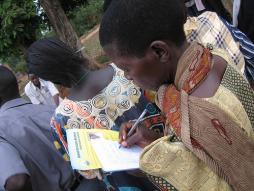
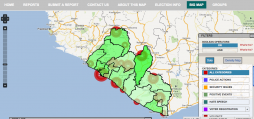
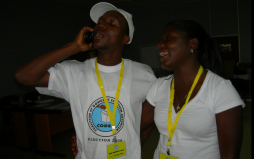

 Since SlingshotSMS runs on a USB drive, you just plug it in, plug in your phone, and set up what website you want to have the SMS messages sent to. The SMS messages are turned into RSS 2.0 and PUSHed, like as a
Since SlingshotSMS runs on a USB drive, you just plug it in, plug in your phone, and set up what website you want to have the SMS messages sent to. The SMS messages are turned into RSS 2.0 and PUSHed, like as a 


